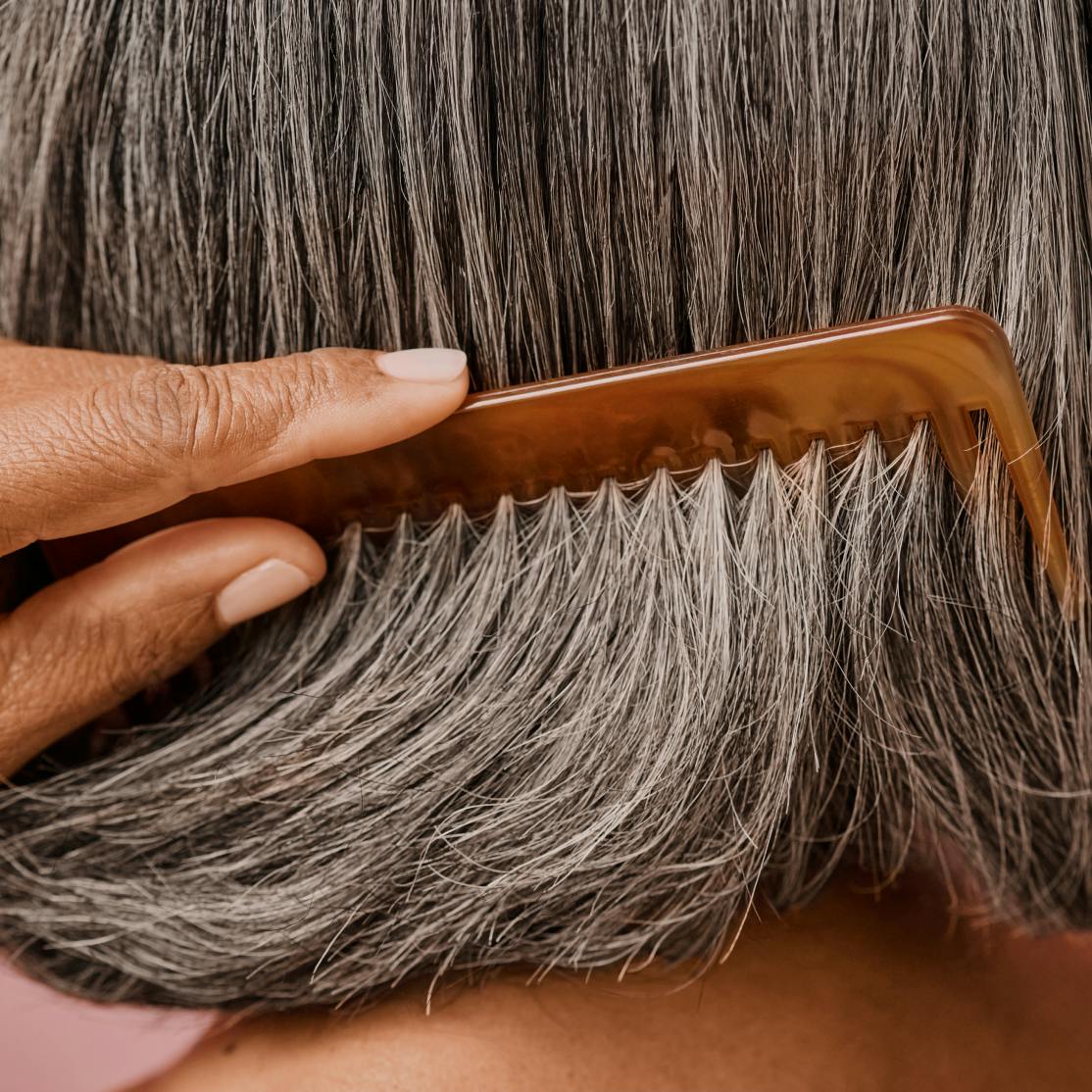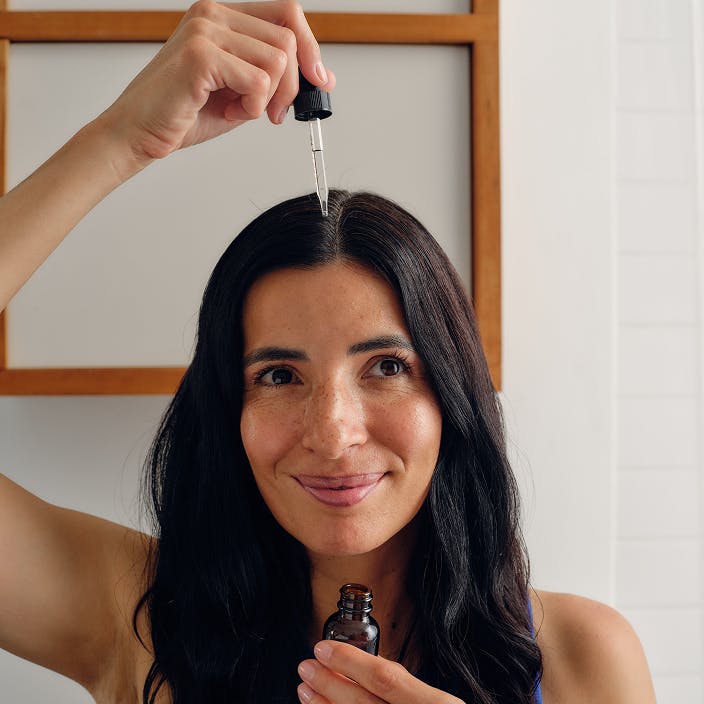When perimenopause and menopause start messing with your hair, leaving it feeling less lush than it used to, the right hair growth products for women can help bring back some of that fullness. Whether you prefer natural supplements or FDA-approved treatments, read on for a range of solutions to help restore your hair to its glory. And don't feel like you have to figure this out on your own. At Midi Health, our clinicians can guide you to the right products and treatments for your hair goals.
Let's be real—perimenopause and menopause throw us enough curveballs already. Between the meno belly, brain fog, and those 3 a.m. wake-ups, you're dealing with plenty. But then you catch your reflection and notice your ponytail looking a little...sparse? Or you spot a thinner patch you swear wasn't there last month? Yeah, that hits different.
Here's the thing: You're definitely not alone. More than half of women deal with some hair thinning as they age, mostly thanks to dropping estrogen levels (the same hormone shifts causing your other fun symptoms). And because hair grows super slowly—remember how long it took those postpartum baby hairs to catch up after having kids?—getting your hair back to its former glory takes some patience and the right game plan.
The good news? There are products that actually work, whether they're ingredients in your shampoo, treatments you apply directly to your scalp, or supplements you can pop with your morning coffee.
So…How Does Your Hair Growth Work?
You might think hair growth is pretty straightforward—it grows out of your head until you cut it or it falls out, right? Well, it's a bit more complex than that.
Your hair actually goes through four distinct phases:
- Anagen phase: This is the growth stage, where about 80% to 90% of your hair is at any given time. Hair actively grows for 2 to 8 years (lucky genetics if you're on the longer end!)
- Catagen phase: This is the prep-for-goodbye stage. Your follicle shrinks, and growth slows as hair starts separating from the follicle. Only 1% to 3% of your hair is in this stage at any time.
- Telogen phase: Think of this as the waiting room phase. Your hair is resting before it sheds, while the follicle gets ready to sprout new growth.
- Exogen phase: The official goodbye has arrived. Old hair sheds, and you (hopefully) see a new baby hair taking its place.

Lots of things can mess with these cycles, including:
- your genetics
- illness and stress—thyroid problems, as well as lupus, some cancers, and certain medications, can all play a role in hair loss
- your diet, whether you’re deficient in key nutrients (more on that below) or if you’ve recently lost a lot of weight quickly, especially on a GLP-1 medication, since there are emerging concerns about a link between those medications and hair loss
- hormonal changes (hello, pregnancy and menopause!)
There's also a testosterone connection here. Over time, testosterone converts into a molecule called dihydrotestosterone (DHT), which makes hair follicles shrink, leading to hair loss. Men have more testosterone, so they typically see more dramatic hair loss, but women experience it, too—just usually in a different pattern.
Types of Hair Growth Products
As with most beauty products, when it comes to hair growth you’ve got options.
Topical treatments
Think serums, foams, gels, and specialized shampoos that you apply directly to your scalp to target regrowth, like Rogaine, for example.
Oral supplements and vitamins
These include hair-specific supplements or individual vitamins that support hair health from the inside out.
Laser treatments
The newest player in the game is red light laser therapy, which you can get in a salon or try at home to stimulate your scalp. It’s backed by evidence that the red light increases blood flow to your hair follicles, but you do need to use it consistently over many months to see a difference.
What to Look for in a Hair Growth Product

Just like your body needs good nutrition to stay healthy, your hair has its own wish list of ingredients. Here's what to keep an eye out for as potential ingredients in formulas you choose:
Minoxidil
This is the heavy hitter—an FDA-approved treatment that comes as a foam or liquid you apply to your scalp. It's one of the most proven ingredients for fighting hair loss. It works, in part, by lengthening and prolonging the anagen (growth) phase of the hair cycle—and that decreases hair loss and results in overall thickening.
Ketoconazole
This ingredient, also found in some medicated shampoos that treat dandruff, has been shown to help with hair loss by reducing inflammation on the scalp and inhibiting DHT, a hormone linked to hair thinning.
Finasteride
Finasteride is another medication used off-label to treat hair loss, and there’s been some evidence showing it can help with hair density in women.
Latanoprost
This is an ingredient initially developed to treat glaucoma, but it has shown potential for stimulating hair growth, including in women with female-pattern hair loss. When applied topically, it may help extend the hair growth phase and promote thicker, longer hair.
Collagen peptides
Collagen makes up your skin, hair, nails, and more. Research has shown that collagen peptides can increase hair elasticity and gloss—making it a potentially good add-on to any hair care regimen. That said, high-quality human studies have yet to definitively prove its ability to promote hair growth.
Saw palmetto
Research has found that this plant extract (usually in pill form) may help disrupt the testosterone cycle—specifically by blocking DHT—that leads to hair loss and could improve growth.
Iron and zinc
Iron carries oxygen to your hair follicles, while zinc helps with cell production, hormone balance, and keeping those oil glands around your follicles healthy. You can get these through foods like seafood, red meat, spinach, and lentils, or talk with your doctor about supplements.
True Stories Of Transformation
Hair Growth Takes Time: Not an Overnight Fix…
Here's the reality check: Remember how we said hair growth cycles can last up to 8 years? That means while hair thinning might seem sudden, it's probably been happening gradually. And, unfortunately, fixing it takes time, too.
With minoxidil, you're looking at least 6 months before you see results. Other ingredients don't have as much research, but the pattern is the same—you need to commit to consistent use for several months before seeing benefits.
And here's the kicker: You can't just stop once you see results. These products support your hair's growth cycle, so when you stop using them, the benefits stop, too. Think of it like going to the gym—you have to keep it up to maintain the results.
Also, let's manage expectations here. If you never had super thick hair to begin with, no product is going to give you a completely different head of hair, especially as you age. But you can definitely improve what you're working with.
How to Choose the Right Hair Growth Product for You
Hair growth products aren’t a one-size-fits-all supplement. When you’re considering the options, here are some things to think about:
- How often do you blow-dry your hair? Styling preferences will affect your product choices. For instance, all topical minoxidil products are water based, which will revert straightened hair styles back to their curly form. Women who rely on heat-based styling for straightening will find the daily use of minoxidil frustrating.
- Do you mind taking pills? Saw palmetto is often taken in capsule or tablet form, so if that bothers you, you can stick with a topical product like minoxidil.
- Do you have sensitive skin? Products that are used on your scalp, like minoxidil, can irritate sensitive skin, so another option might be best for you.
- How much money do you want to spend? When you consider that you need to invest in any product you choose for months, it’s important to think about your budget. The supplements can add up, and some of the laser-therapy devices are quite expensive.
More Ways to Support Your Hair Growth
Your overall health directly affects your hair, so don't underestimate these basics:
- Eat well: Focus on hair-friendly foods rich in biotin, zinc, iron, and vitamins.
- Manage stress: Chronic stress pushes hair follicles into rest mode.
- Stay hydrated: Your scalp needs water, too.
- Get enough sleep: Your body repairs and grows during rest.
- Don't smoke: It restricts blood flow to your scalp.
- Keep your hair clean: Regular washing and brushing prevent buildup.
- Trim your hair regularly: Healthy ends mean healthier overall hair.
Frequently Asked Questions (FAQs)
Is there really a hair growth product that works?
When hair loss is observed, a clinician should first determine its cause in order to arrive at the most effective treatment. Both FDA-approved ingredients and natural supplements can help support and stimulate hair growth, as well as fight off the hair loss that comes with age, once the root cause is established.
What is the #1 dermatologist-recommended hair growth supplement?
You want to look for products that have key ingredients that are proven to support hair growth. Midi’s Hair Regrowth Serum is specifically formulated to treat hair loss by stimulating new growth, reducing shedding, slowing hair thinning, and supporting a healthy scalp.
What is the best product to stimulate hair growth?
It depends on your preferences. Love topical treatments? Try minoxidil. Prefer pills? Consider saw palmetto. The best product is the one you'll actually use consistently.
Does anything really work for female hair loss?
While female hair loss is unfortunately common during menopause, ingredients like minoxidil, biotin, saw palmetto, zinc, iron, and collagen peptides can all help give your body what it needs to grow stronger, thicker hair. Laser therapy is another option worth exploring.
What is the best product to grow your hair faster?
There's no magic bullet, and you might need to try a few options to find your winner. But combining a healthy lifestyle with the right hair growth product for your needs will get you to healthier, happier hair.
If you’re in perimenopause or menopause and want guidance from clinicians who specialize in women’s midlife health, book a virtual visit with Midi today.
Hormonal change is at the root of dozens of symptoms women experience in the years before and after their period stops.
Our trained menopause specialists can help you connect the dots to guide you towards safe, effective solutions.
Whether you need personalized guidance or a prescription routine to tackle symptoms—including brain fog, hot flashes, sleep trouble, mood swings, and weight gain—we’ve got you covered. Learn more here.
Midi’s mission is to revolutionize healthcare for women at midlife, wherever they live and whatever their health story. We believe that starts with education, to help all of us understand our always-changing bodies and health needs. Our core values guide everything we do, including standards that ensure the quality and trustworthiness of our content and editorial processes. We’re committed to providing information that is up-to-date, accurate, and relies on evidence-based research and peer-reviewed journals. For more details on our editorial process, see here.

 Kristen Wolfe, MD
Kristen Wolfe, MD




